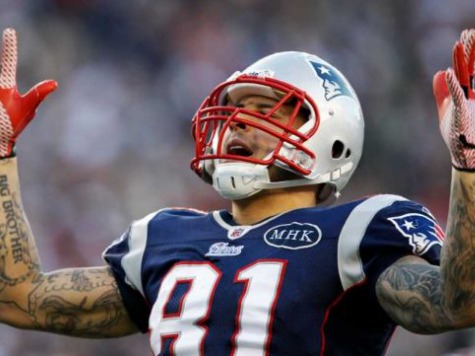When friends Daniel Jorge Correia de Abreu and Safiro Teixeira Furtado fell victim to a drive-by shooting in Boston on July 15, 2012, their deaths made local headlines but no sense. Now that police have identified Aaron Hernandez as a suspect in the unsolved murders, their deaths make national headlines but less sense.
Why would a tight end fresh off a Super Bowl appearance, and on the verge of signing a $40 million contract, kill two immigrants, one a former police officer and the other a tour guide in Cape Verde, completely unknown to him until that night?
The warrant filed by Bristol, Connecticut police in the city’s district court seeks recordings from jailhouse phone conversations between Alexander Bradley, Hernandez’s companion on the night of the double-homicide, and unnamed third parties. The Hartford Courant first reported on the filing yesterday. Police believe that Bradley may have discussed the case on the phone while incarcerated despite periodic automated interruptions informing those on the line that the facility records such conversations.
Bradley is the same man who alleges in a civil suit that Aaron Hernandez shot him in the eye last February in Miami. The pair appears on surveillance footage in a parking garage near the double-murder scene as well as in the dance club where the two decedents enjoyed their final night until a skirmish broke out between their group and Hernandez’s. Witnesses say that immediately prior to the drive-by shooting, a gunman sitting in the rear passenger seat of a silver SUV with Rhode Island plates, began laughing. The description of one of the assailants resembles the former New England Patriot. In addition to the two decedents, the bullet-ridden BMW contained three survivors, including a surviving victim of the gunfire.
Although the warrant doesn’t name a trigger man in the killings, evidence mounts linking Hernandez to the crime.
Last June, authorities towed a silver Toyota 4-Runner with Rhode Island plates from the Connecticut home of Hernandez’s uncle. Police believe that the car belonging to Hernandez collecting dust in his uncle’s garage matches the one surveillance cameras caught him driving on the night of the double murder and the one slowly stalking the BMW of the men victimized by the drive-by shooting.
That same month, police in Springfield, Massachusetts discovered the weapon used to kill the Cape Verdeans in the trunk of a car crashed by a woman hailing from Hernandez’s hometown, Bristol, Connecticut. The woman claims unnamed football players left the weapon with her.
Hernandez’s name has come up in other cases. A 2007 Gainesville, Florida shooting, which occurred during Hernandez’s freshman year at the University of Florida, witnessed men labeled as football players approach a car. One of the men, described as “Hawaiian” or “Hispanic,” six-foot-three or six-foot-four, 230 pounds, and covered in tattoos, unleashed five rounds into the front seat of the car, wounding two. Hernandez refused to talk to police in that case.
The failure to punish the perpetrators in that Gainesville shooting may have had a cascading effect on other lives. Assuming the Gainesville gunman graduated to murder, apprehending the shooter despite the short-term pain caused to the local football program would have prevented more pain in the long run. And just as it’s possible that Hernandez may have been wrongly ensnared in that investigation, it’s also possible that Hernandez may have escaped notice in other shooting investigations.
The involvement of Hernandez in the double-murder cold case once would have seemed more preposterous than his possible involvement in unnamed, unsolved shootings. Yet, the evidence in the double-murder actually appears stronger than the evidence in the murder for which Hernandez has been indicted. The gun, the SUV, the surveillance footage, the eyewitnesses, and the scuffle in the club together provide means, motive, and opportunity. Police hope the jailhouse phone recordings add to their evidence. And the senseless slayings outside of Boston’s Cure nightclub may make sense of the subsequent shooting of Bradley, the killing of Lloyd, and Hernandez’s increasingly bizarre behavior (e.g., frantically reporting dangers to his life to Patriots coach Bill Belichick, renting a “safe” house, and keeping a rifle by him in a gym bag all detailed in Rolling Stone‘s “Gangster in the Huddle” article) in his last months as a free man.
Was the alleged maiming of Bradley by Hernandez part of failed attempt to cover-up the double murder? Was the murder of Odin Lloyd part of that same cover-up? A bouncer at Rumor, the nightclub Lloyd and Hernandez partied at the weekend of Lloyd’s murder, told police that one of his patrons “accidentally spilled the beans in front of me.” Was the loose-lipped patron Lloyd?
Hernandez’s alleged PCP use, alleged involvement in the Bloods street gang, and name arising in numerous shootings invites speculation. Could what we think we know about the former New England Patriot be less shocking than what we’ve yet to find out?
As Aaron Hernandez sits in Massachusetts’s Bristol County Jail awaiting trial for Odin Lloyd’s murder, the former All-American and Pro Bowl tight end leaves more questions than answers, not the least of which is this: Is the versatile end who caught the last of Tom Brady’s nine Super Bowl touchdown passes a serial killer?

COMMENTS
Please let us know if you're having issues with commenting.